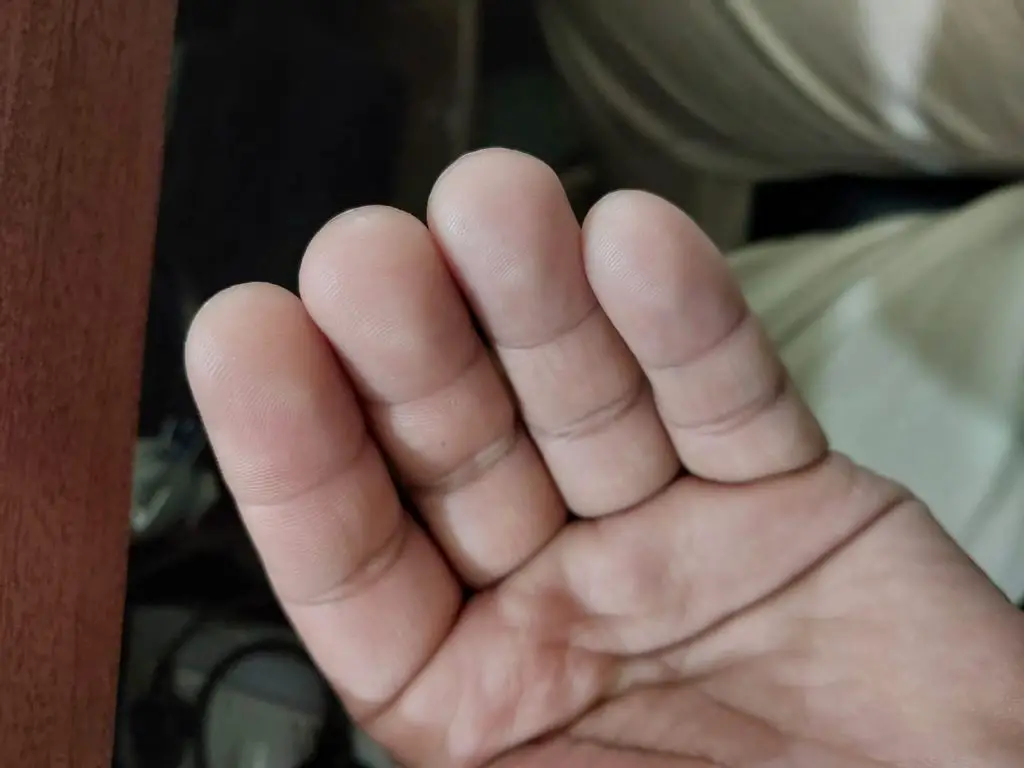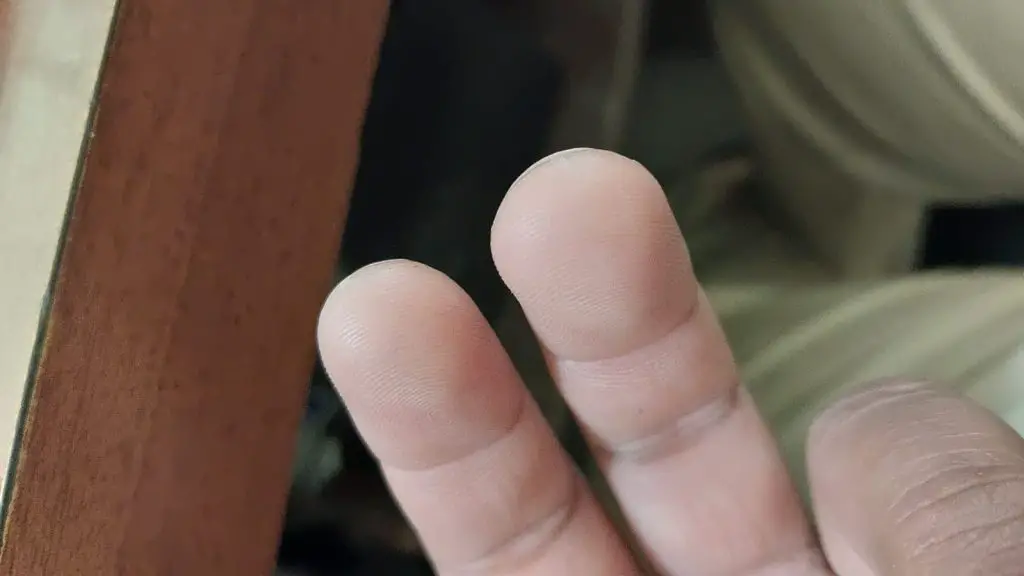Calluses are common in beginner ukulele and guitar players. Most ukulele enthusiasts develop this when they start learning it.
So, first of all, there is nothing to worry about it. It’s actually an advantage of ukulele players to develop calluses as this makes playing the ukulele more comfortable.
So, calluses are not a problem but a solution to playing your ukulele with ease.
Right?
Well, In this article, we will discuss all the calluses developed by your ukulele love.
Whether you’re an experienced ukulele player or just starting out, this information will help you keep your fingers healthy and pain-free while practicing your ukulele.
So, without further ado, let’s start this article.
Disclosure: This post may contain affiliate links, which means we may receive a commission if you click a link and purchase something that we recommended. Read more about Affiliate disclosure here.
Contents
- How Long Does It Take To Develop Calluses for Ukulele?
- Do Ukulele Calluses Go Away?
- How and Why Does Ukulele Cause Calluses?
- Do Calluses Grow Back Harder?
- Do Calluses Become Permanent?
- Is It Ok to Cut off Calluses?
- Is It Better to Leave Calluses?
- What Happens if You Leave Calluses?
- How To Cure Calluses?
- Conclusion
How Long Does It Take To Develop Calluses for Ukulele?
The development of calluses on your fingers is just a natural thing occurred while practicing any stringed instrument, including the ukulele.
The constant pressure and friction between the strings and your fingertips cause the skin to thicken and harden over time.
This thick and hard part of the finger initially starts paining a little bit, but the pain goes with time.
How long it takes time to develop calluses depends on factors such as the frequency and duration of your practice sessions, the type and gauge of strings you use, and your individual skin type and sensitivity.
Generally, it can take anywhere from a few days to a few weeks for calluses to develop on your fingers. But it can vary depending upon the factors I have mentioned above.
So, don’t try to rush to develop calluses on your fingers by playing for long periods of time or using heavier strings than you’re uncomfortable with. This would just give you pain, discomfort, and even injury.
Instead, you have to gradually increase your practice time and allow your fingers to rest when they feel sore or fatigued.
With time, your fingers will naturally start developing calluses to make playing the ukulele more comfortable for you.
Read also,
Do Ukulele Calluses Go Away?

First of all, if you want to be a lifetime ukulele player, you don’t need to worry about the calluses. As I’ve mentioned above, these actually help you to play your ukulele comfortably.
These are natural and necessary part of playing the ukulele. However, if you still want your calluses to go away, you can take a break from playing.
When you take a break from playing your ukulele for a period of time, it will allow the skin on your fingers to rest and recover from calluses and they may start to soften with time.
If you want fast results then you may use a moisturizing cream or lotion on your hands regularly. This helps soften the skin and reduce calluses.
However, if you want to apply cream during the playing, don’t apply too much as this can make your fingers slippery and affect your playing.
Read also,
How and Why Does Ukulele Cause Calluses?

Let me answer this question in two parts.
First, why calluses develop on Ukulele?
Well, I have already answered this question above.
Building calluses on our fingers is a natural and also necessary part of playing the ukulele.
When we play the ukulele, its strings create pressure and friction on our fingertips. This pressure cause the skin to thicken and harden over time.
This is a natural process of your body to protect your fingers from pain and discomfort while playing ukulele for longer periods.
Now, let’s come on to the “how” part of this question.
Building calluses on your fingers is a natural process that does not need anything extra from you apart from practicing the ukulele.
However, it’s important to start slowly and gradually increase the practice time and frequency. This way you can be able to adjust to the pressure on your fingers and develop thicker skin with time.
Also, use the correct playing technique that I have already shared in my other articles to prevent excessive pressure on your fingers.
Do Calluses Grow Back Harder?
This is a question that my readers always ask me and also a common misconception that calluses grow back harder WHEN you try to remove them or worn down. However, this is not actually true.
Calluses work on newtons 3rd law which is just a natural response to pressure or friction on the skin against the strings.
They help protect the area from further damage.
Now, when calluses you try to remove Calluses, whether by cutting or filing them down, your skin may feel softer and more sensitive for a period of time.
However, I don’t recommend it to you, as if the THIN SKIN behind the Calluses continues to be exposed to pressure or friction, it starts paining, and even bleeding.
With time it will start to become thick and hard again, eventually forming new calluses. But, you may not go through this painful process again and again by cutting or filing them down.
Read also,
Do Calluses Become Permanent?
No, they are not necessarily permanent. If you stop practicing your ukulele for a while, and you do proper care and maintenance, calluses can gradually fade over time.
But, if you continue your playing, then as a natural process Calluses be always on your fingers. However, it will soften a bit with time as your fingers will become compatible with the strings. But it takes time.
Is It Ok to Cut off Calluses?
No, I don’t recommend you cut off Calluses. They act as a natural barrier between your healthy ukulele playing and injury.
They prevent your fingers to be injured due to the friction between your skin and the strings.
When you cut or shave down Calluses, it can expose the sensitive layers of skin underneath, which can be painful and increase the risk of infection.
So, instead of cutting off calluses, it’s better to take steps to prevent them from becoming too thick or uncomfortable.
With proper playing technique, taking breaks when your fingers feel sore or fatigued, and using moisturizing cream or lotion regularly you can actually prevent the Calluses from becoming too thick and noticeable.
Is It Better to Leave Calluses?
Calluses are normal for any stringed instrument player and it’s actually beneficial for you. So, you should leave it. However, you may prevent them from getting too thick by opting for the tips I have shared above.
Only if your calluses are causing significant discomfort or pain, you may seek advice from a medical professional or music instructor for guidance on proper technique and offer recommendations for reducing discomfort while playing.
Otherwise, you can leave them in place.
What Happens if You Leave Calluses?
If you leave calluses on your fingertips and don’t stop practicing, they will continue to thicken and harden over time. Calluses are a normal and necessary part of playing the ukulele.
However, with time they become thick and uncomfortable, which may make it difficult to play the ukulele.
They can also cause pain and soreness, which can make it harder to play for long periods of time.
So, you should keep an eye on them and prevent them from becoming too thick and noticeable by following the tips I have mentioned earlier in this article.
How To Cure Calluses?
Calluses are normal for a Ukulele player. You don’t actually need to cure them.
Remember, if you are a regular ukulele player then Calluses cannot be cured until you stop playing.
But sometimes they can become uncomfortable or unsightly and you want to manage them and reduce their impact on your playing and overall comfort. In this situation, you can take the below steps.
- Keep your hands clean and dry always: This can help prevent infection.
- Use moisturizing lotion or cream, especially when playing: This can help keep the skin soft and reduce the risk of cracking and discomfort.
- You can also use a pumice stone or emery board: Be careful not to remove too much skin or damage the underlying tissue.
- Take regular breaks: If your calluses are causing discomfort or pain, take a break from playing. It will give your fingers a chance to rest and recover.
- Use proper playing technique: Proper playing technique can help you reduce the pressure and friction on your fingertips, and ultimately help prevent calluses from becoming too thick or uncomfortable.
- Get advice from a professional: You can also seek advice from a medical professional or music instructor. They will give better guidance to manage Calluses.
Conclusion
Calluses are natural for any stringed instrument player. So, they cannot be cured.
However, they can be managed with proper care and attention. You can prevent them from becoming too thick or uncomfortable with good hand hygiene, using moisturizing lotion or cream, gentle filing, proper playing technique, and taking breaks when necessary.
But remember, don’t cut off or remove it entirely. This can lead to injury or infection.
Seek advice from a professional if your calluses are causing significant discomfort or pain.
That’s it.
Related,
